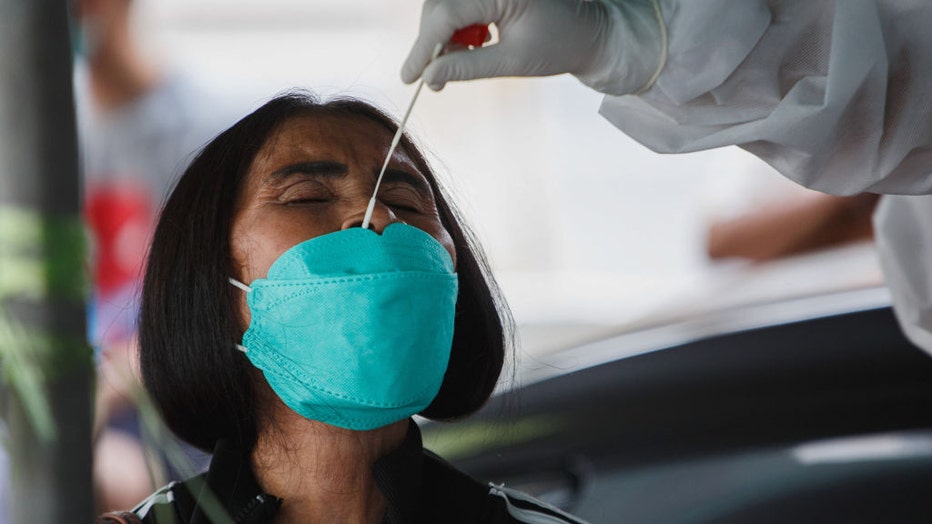'Disease X': Scientists creating contingency plan for infectious virus outbreak
World leaders to discuss hypothetical 'Disease X'
Infectious disease doctor Peter Chin-Hong joins LiveNOW's Austin Westfall to explain why world leaders are already preparing for the next possible global health threat, known as "Disease X."
Attendees at the World Economic Forum in Davos will discuss the prospect of a virus far more potent than COVID being unleashed across the world.
The hypothetical virus, dubbed by the World Health Organization (WHO) as Disease X, has not yet been formed but scientists and attendees at the global confab say they will be chatting about the potential pathogen so that they can prepare properly should it ever strike.
"With fresh warnings from the World Health Organization that an unknown ‘Disease X’ could result in 20 times more fatalities than the coronavirus pandemic, what novel efforts are needed to prepare health care systems for the multiple challenges ahead?" a page detailing the meeting states on the WEF website.
The session will be led by Tedros Adhanom Ghebreyesus, the director general of WHO, who oversaw the organization’s response to the COVID-19 pandemic, as well Nisia Trindade Lima, Brazil’s minister of health, and Michel Demaré, the chair of the board at pharmaceutical giant and vaccine maker AstraZeneca.
"Disease X," a placeholder name given by the WHO to a theoretical virus that has not yet been formed, was added to the WHO’s short list of pathogens for research in 2017 that could cause a "serious international epidemic," according to a 2022 WHO press release. Other viruses added to the now updated list include Severe Acute Respiratory Syndrome (SARS), Ebola and Middle East respiratory syndrome (MERS).
COVID-19, caused by a novel coronavirus, was an example of Disease X and has also been added to the WHO list. A novel virus is one that hasn't been found in humans in the past.
"Targeting priority pathogens and virus families for research and development of countermeasures is essential for a fast and effective epidemic and pandemic response," Dr Michael Ryan, the executive director of the WHO’s health emergencies program, said in the 2022 press release.
"Without significant R&D (research and development) investments prior to the COVID-19 pandemic, it would not have been possible to have safe and effective vaccines developed in record time."

FILE - A healthcare worker collects a nasal swab sample from a person at a drive-thru testing site. (Photo by Varuth Pongsapipatt/SOPA Images/LightRocket via Getty Images)
The WHO said that by flagging these pathogens as a priority, it can lay out preparedness roadmaps, knowledge gaps and research goals, as well as drug therapies and diagnostic tests.
COVID-19 LOCKDOWNS: WHAT'S UP WITH NOSTALGIA FOR THE ‘OUTBREAK ERA'?
"Where relevant, target product profiles, which inform developers about the desired specifications for vaccines, treatments and diagnostic tests, are developed," the statement reads.
"Disease X represents the knowledge that a serious international epidemic could be caused by a pathogen currently unknown to cause human disease," the WHO says on its website. "The R&D (research and development) blueprint explicitly seeks to enable early cross-cutting R&D preparedness that is also relevant for an unknown 'Disease X.’"
For instance, it took just 326 days from the release of the genetic sequence of the SARS-CoV-2 virus to the authorization of the first COVID vaccine, thanks in part to the work done since 2017 in preparation for Disease X, according to Bloomberg. Now groups like the Coalition for Epidemic Preparedness Innovations (CEPI) are supporting rapid response vaccine platforms that could develop new immunizations within 100 days of a virus with pandemic potential emerging under a $3.5 billion plan.
Scientists do not yet know what the next deadly virus might be or how it may be formed.
"This concept [of Disease X] was one of the lessons we learned from this [COVID] pandemic," Dr. Thomas Russo, an infectious diseases expert at the University of Buffalo Jacobs School of Medicine and Biomedical Sciences, told The Independent.
"As mankind breaks down these barriers [between humans and other species] through live animal markets and deforestation, we need continued surveillance and studies and improved biosecurity across the world."
Disease X could also turn out to be a new pathogen not yet known even among animals, he warned.
CLICK HERE TO GET THE FOX NEWS APP
Meanwhile, Monica Crowley, a former assistant Treasury secretary, said the WEF meeting’s attendees may have more sinister goals in mind concerning Disease X.
"Just in time for the election, a new contagion to allow them to implement a new WHO treaty, lock down again, restrict free speech and destroy more freedoms," Crowley wrote on X.
"Sound far-fetched? So did what happened in 2020. When your enemies tell you what they’re planning and what they’re planning FOR, believe them. And get ready."
Get updates to this story on FOXNews.com.

